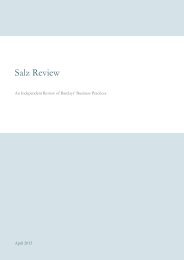Excerpts from the depositions - Wall Street Journal
Excerpts from the depositions - Wall Street Journal
Excerpts from the depositions - Wall Street Journal
Create successful ePaper yourself
Turn your PDF publications into a flip-book with our unique Google optimized e-Paper software.
Case 2:11-cv-10549-MRP-MAN Document 254-1 Filed 03/28/13 Page 15 of 35 Page ID<br />
#:16604<br />
And to your understanding, did that occur in <strong>the</strong> Asset Purchase Agreement? [Objection]<br />
A. No, it didn’t.” 143:5–24.<br />
• “A. I knew <strong>from</strong> work I [had] done, I felt <strong>the</strong> law was that to transfer tort claims,<br />
<strong>the</strong>y have to be specifically addressed. And <strong>the</strong>re are types of form documents out<br />
<strong>the</strong>re that specifically addressed transferring tort claims.” 71:9–14.<br />
• “A. We had specific experiences where we had done that [transferred tort claims],<br />
and due to <strong>the</strong> misalignment of interest between <strong>the</strong> people that ultimately held<br />
<strong>the</strong>m and our witnesses, and o<strong>the</strong>r data, we—we hassled. But really it was, you<br />
know, we would have to provide data, <strong>depositions</strong> and things whenever—we had<br />
never – and we didn’t have an interest in <strong>the</strong> outcome of <strong>the</strong> case anymore. And so,<br />
you know, had – had I known, had I known that, you know, <strong>the</strong> Fed might have<br />
wanted those claims, that would have been one of <strong>the</strong> things we would have needed<br />
to talk about. We would have needed to talk about price, enforcement, whe<strong>the</strong>r—<br />
you know, how we stop it whenever, whenever it’s getting out of hand for us,<br />
because of <strong>the</strong> potential misalignment of interest in previous work I’d done in that—<br />
in that regard.” 71:15–72:11.<br />
• “A. [M]y own experience and AIG’s experience in transferring those types of claims,<br />
which we had done in o<strong>the</strong>r context, was that you needed to deal with additional<br />
issues like <strong>the</strong> potential misalignment of interest between <strong>the</strong> party that has <strong>the</strong><br />
claims <strong>the</strong>n and can—for lack of a better way to say it, pursue, pursue those claims<br />
without regard to <strong>the</strong> cost to AIG in providing data, <strong>depositions</strong> and o<strong>the</strong>r materials<br />
necessary in order to pursue those claims.” 144:7–18.<br />
• “A. So, you can be put in a position where you’re doing a whole lot of work to<br />
support <strong>the</strong> claims and, yet, at <strong>the</strong> same time, you’re not getting any of <strong>the</strong> value out<br />
and you can’t stop <strong>the</strong> o<strong>the</strong>r party <strong>from</strong> continuing to pursue <strong>the</strong>m. We had had a<br />
problem with that, you know, previously that I was involved in. Q. And are <strong>the</strong>re<br />
any provisions in <strong>the</strong> final version of <strong>the</strong> Asset Purchase Agreement that deal with that<br />
potential problem that can arise when tort claims are assigned? [Objection] A. No . . .<br />
[<strong>the</strong>re are] not.” 144:19–145:11.<br />
• “A. I knew at <strong>the</strong> time, under New York law, that you needed to specifically refer to<br />
<strong>the</strong>m [tort claims]. I knew that we would have needed to deal with making data<br />
available to <strong>the</strong> Fed to allow <strong>the</strong>m to pursue those claims if <strong>the</strong>y were to have<br />
received <strong>the</strong>m. We needed to think about limiting <strong>the</strong> scope of data. If we wanted<br />
to, we needed to think about if <strong>the</strong> price being paid made sense. If <strong>the</strong>re is no<br />
additional compensation in terms of <strong>the</strong> security, we needed to think about whe<strong>the</strong>r<br />
or not <strong>the</strong> one-sixth remainder would justify some of <strong>the</strong> potential lawsuits that<br />
might have been filed. There were a number of things that needed to be thought<br />
through and dealt with in order to—to transfer those claims in a meaningful way.”<br />
149:9–150:3.<br />
• “Q. And was that your only o<strong>the</strong>r prior experience with <strong>the</strong> transfer of litigation claims<br />
that you were referencing in your earlier testimony? A. No. . . . There were o<strong>the</strong>rs, both<br />
in <strong>the</strong> context of—of an assignment, and <strong>the</strong>n separately having to deal with <strong>the</strong><br />
misalignment of interests that occurred in one case whenever we transferred <strong>the</strong><br />
EXHIBIT 2<br />
5
















